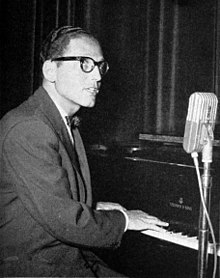Tom Lehrer
| Tom Lehrer | |
|---|---|

Lehrer performing in 1960
|
|
| Background information | |
| Birth name | Thomas Andrew Lehrer |
| Born |
April 9, 1928 New York City, New York, United States |
| Genres | Satire, comedy, science |
| Occupation(s) | singer-songwriter, satirist, mathematician |
| Instruments | Vocals, piano |
| Years active | 1945–71, 1980, 1998 |
| Labels | Lehrer Records Reprise/Warner Bros. Records Rhino/Atlantic Records Shout! Factory |
| Associated acts | Joe Raposo |
Thomas Andrew "Tom" Lehrer (/ˈlɛr.ər/; born April 9, 1928) is a retired American singer-songwriter, satirist, and mathematician. He has lectured on mathematics and musical theater. He is best known for the pithy, humorous songs he recorded in the 1950s and '60s.
His work often parodies popular song forms, though he usually creates original melodies when doing so. A notable exception is "The Elements", where he sets the names of the chemical elements to the tune of the Major-General's song from Gilbert and Sullivan's Pirates of Penzance. Lehrer's early work typically dealt with non-topical subject matter and was noted for its black humor in songs such as "Poisoning Pigeons in the Park". In the 1960s, he produced a number of songs dealing with social and political issues of the day, particularly when he wrote for the U.S. version of the television show That Was the Week That Was. Despite their topical subjects and references, the popularity of these songs has endured; Lehrer quoted a friend's explanation: "Always predict the worst and you'll be hailed as a prophet."
In the early 1970s, he mostly retired from public performances to devote his time to teaching mathematics and music theatre at the University of California, Santa Cruz.
Lehrer was born in 1928 to a Jewish family and grew up in Manhattan's Upper East Side. Although he was raised Jewish, Lehrer became an agnostic. He began studying classical piano at the age of seven, but was more interested in the popular music of the age. Eventually, his mother also sent him to a popular-music piano teacher. At this early age, he began writing show tunes, which eventually helped him as a satirical composer and writer in his years of lecturing at Harvard University noting the influence one of his professors Irving Kaplansky, and later at other universities.
...
Wikipedia
